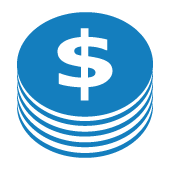An HSA makes it easy to put your health first. Put a little aside every paycheck, and earn dividends on those growing funds.
Key Features
-
 Competitive Dividends
Competitive Dividends
-
 No "Use It or Lose It" Policy
No "Use It or Lose It" Policy
-
 Tax Advantages1
Tax Advantages1
- Greater personal control over healthcare management and expenses
- Prepare for qualified medical expenses
- Earn dividends above standard savings on entire balance
- An HSA provides triple tax savings:
- Tax deductions when you contribute to your account
- Tax-free earnings through investment
- Tax-free withdrawals for qualified medical, dental, vision expenses, and more1
- Contributions are tax-free and can be made by you, your employer, or a third party
- Funds can be withdrawn at any time2
- Avoid the $2 monthly service fee by maintaining a balance of $500 or more
- No minimum balance requirements
- Unused funds remain in account year after year; no "use it or lose it" policy
- Keep your HSA in your name, regardless of career or life changes
- No minimum deposit to open
If you are covered under a high-deductible health plan (HDHP) you are eligible to contribute to a Health Savings Account (HSA). An HSA is a tax-exempt account set up for the sole purpose of paying qualified medical expenses not covered by your HDHP.
You are eligible to contribute to an HSA if:
- You are covered under a HDHP.
- You are not also covered by any other health plan that is not an HDHP (certain exceptions apply).
- You are not enrolled in Medicare.
- You cannot be claimed as a dependent on another individual’s tax return.
Based on your eligibility to establish an HSA, your employer, your family members and any other person may contribute to your HSA whether you are self-employed or unemployed.
Is an HSA like a Flex Benefit Plan?
No. HSA funds do not expire and how the money is spent is up to you. Keep in mind, funds used for anything but qualified medical expenses are subject to taxation and, prior to the age 65, a penalty.
How much can I contribute to my HSA?
Contribution limits vary annually. Please contact a VCCU member service representative for more information.
Catch-up contributions are available for eligible individuals who are age 55 or older and for any months individuals are not enrolled in Medicare.
How do I access my HSA funds?
- If you have a checking account at VCCU, you can make transfers from your HSA to your checking account (online, in person, or over the phone).
- You can withdraw funds as cash to pay for medical expenses.
It is your responsibility to keep track of what money comes out of your HSA and keep all receipts for medical expenses for end of the year taxes.
For more information and answers to your questions about establishing a Health Savings Account at Valley Communities Credit Union, talk to one of our member service representatives.
1Valley Communities Credit Union does not provide tax advice. Consult your own accountant or tax advisor before acting on this information.
2You can withdraw funds at any time for any purpose. However, if funds are withdrawn for reasons other than qualified medical expenses, the amount withdrawn will be included as taxable income, and is subject to a 10% penalty.



